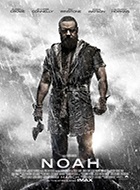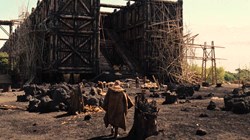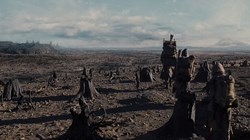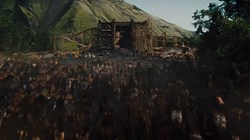Genesis
លោកុប្បត្តិ (កំណើត ពិភពលោក)
Book
of BEGINNINGS -- heavens and earth, light and darkness, seas and land,
animals and vegetation with humankind as the climax of God's creative
activity "in His image". Book of RELATIONSHIPS -- between God and His
creation, between God and humankind, and between human beings. Written
by Moses approx. 1440 B.C. ("before Christ") during the Exodus.
Noah
After a flood of reviews and controversy, it's finally here. So should you see it?

Our Rating

PG-13
Genre
Epics
Directed By
Darren Aronofsky
Cast
Emma Watson, Jennifer Connelly, Logan Lerman, Russell Crowe
Theatre Release
March 28, 2014 by Paramount Pictures
Here's my take: Christianity Today reader, you should see Noah.
I can't promise you'll like Noah. Nor would I suggest that if you don't, it indicates that something is necessarily wrong with you.
But as I struggled to write about this film this week—in the wake of
dozens of other excellent pieces from both mainstream and Christian
sources—that's what it all came down to. So yes, if you're wondering: Noah is worth your time and your ticket price.
Reason 1: Noah is a good movie made by good filmmakers who pursue important questions and think of movies as art.
 Image: Paramount Pictures
Image: Paramount Pictures
Leo Carroll and Anthony Hopkins in ‘Noah’
Darren Aronofsky directed the film (read our interview with him and co-writer Ari Handel),
and what ties Aronofsky's body of work together is a deep concern for
and interest in the most basic building blocks of human-ness.
His films stylistically swing between the mind-bendingly surreal and
the uncomfortably, grittily real, but this is at the core of each one. Requiem for a Dream
looked at humans as the kinds of beings who are driven by a desire for
fulfillment and the good life, no matter how delusional. The Wrestler and Black Swan both
explored embodiment, and painfully, graphically exposed what happens
when we objectify and abstract bodies (male and female) from their
connection to the rest of the human. The Fountain grappled with death and life after death.
I generally like Aronofsky's films, but I was especially captured by the weird, moody, enigmatic Fountain,
which starred Hugh Jackman as, by turns, some kind of ancient wanderer,
a doctor, and a futuristic enlightened consciousness, all in three
stories that spanned a millennium. Lots of people didn't like the movie,
which I understand. But I thought it was fascinating in its expansive
imagination and wrestling with questions about mortality and humanity
(and reincarnation). I thought about it for months afterward.
Noah is another entry in this filmography. It asks big
questions: Are humans worth saving? What is the place of justice and
mercy in existence? How ought people relate to both powers greater than
themselves and to the world in which they dwell?
 Image: Paramount Pictures
Image: Paramount Pictures
Russell Crowe in ‘Noah’
But what makes Noah work, even in its more messy bits, is that it usually avoids asking those questions pedantically. Instead, it embeds them in a story shared by the world's major religions (most ancient mythologies as well). And it retells the story with a startlingly fresh imagination, generally strong writing, and great acting talent—Russell Crowe, Jennifer Connelly, Emma Watson, Ray Winstone, Anthony Hopkins.
(If all you're looking for is a brief review, you can skip down to the "Caveat Spectator" now. But I've got more to say.)
Reason 2: Noah is a solid adaptation.
Adaptations are Hollywood bread and butter, as we all know from endless
arguments over whether the movie is "as good" as the book, or whether
it messes it up, or whether it's possible to effectively even make a
book into a movie, et cetera, ad nauseum.
 Image: Paramount Pictures
Image: Paramount Pictures
Emma Watson in ‘Noah’
What impressed me most about this adaptation was that Aronofsky and Handel, as they explained in their interview with us,
thought of their version of the story as midrash. My best understanding
of the Jewish tradition of midrash is that it is filling in a story
with details from your imagination—staying true to the source where it
says something, while imagining what's between the lines.
Bible movies (with the possible exception of the Jesus film)
have always been a form of midrash. The Bible often leaves out things
that make for good storytelling, like dialogue and scene-setting sensory
details, because that's not its genre. Even the gospels tell us that
Jesus performed many more miracles than are recorded, because there
simply isn't enough room in the books for everything.
I like to think that God made us with imaginations and is okay with
this—even encourages it, so long as we don't mistake our imaginations
for reality. And kids who grow up in church are inducted into this
movie- and story-mediated type of midrash at an early age. (Two words: Veggie Tales. Five more: Adventures in Odyssey's "Imagination Station.")
Noah respects the human's imaginative capacity by thinking of itself as a story about how it could have happened. Where the text says something, Noah does
that thing. But where it is silent, the filmmakers worked hard to
examine tradition, other texts, and what they know of people to think
about one way the story could have worked out. (Even the most
controversial of their narrative choices—something I won't spoil for
you—has echoes of other Bible stories in it; it's probably not what
happened, but things like it happened later, so it's not inconsistent.)
Some will (and have) take issue with how Noah is portrayed: as a
tortured soul, not exactly friendly and cuddly, though he certainly
loves his family. On the other hand, as Mark Driscoll (a person with
whom I have not always seen eye to eye) pointed out at The Resurgence,
there is some debate over what the Scriptural designation of Noah as a
"righteous man" actually means. And given the rocky track record of the
Bible's patriarchs, and the spotty character development of Noah in the
actual book of Genesis, it seems at minimum plausible that Noah was a
complicated man, and as a sinful human, he certainly was one in need of
redemption and forgiveness.
So Aronofsky and Handel aren't suggesting that all the things that appear in this film are what happened. You wouldn't get in a time machine and travel back and see it all work out just like this.
But this is tremendously effective for an adaptation—especially for
those of us who have heard the story our entire lives and grew up
singing about the Lord telling Noah to build an "arky, arky" in Sunday
School. It does what good art should do: it forces us to "re-see" a
story anew, to once again sit on the edge of our seats and wonder what
will happen next. That's hard to do with such a familiar story, and this
is done well, while still respecting and hewing to its source material,
as well as it can.
Reason 3: Noah is visually and imaginatively compelling.
Reportedly, the good folks at Industrial Light & Magic (the special
effects company founded by George Lucas) did some of their most
complicated work on this film, and it shows. The ark is enormous. The
animals are fantastical, but plausible. The rock giants (Handel and
Aronofsky's rendering of fallen angels, one interpretation of the
Bible's "Nephilim") are emotionally resonant in the manner of Peter
Jackson's rendering of Tolkien's ents. The account of creation is pushed
into hand-drawn animation, which fits its place in the narrative. And
one moment in particular, when the camera pulls back to show Noah
standing and watching the wickedness of humanity, took my breath away.
 Image: Paramount Pictures
Image: Paramount Pictures
While I watched Noah (in, unfortunately, a small screening
room—I'd say to see this on the biggest screen you can), I thought once
again that this is the best argument for going to a theater. When a work
of art is as lovingly crafted as this, with such keen attention to
detail, it deserves the biggest screening you can see it on. Allow
yourself to be immersed in the experience. It's worth it.
Reason 4: Noah re-enchants the ancient world in powerful ways that counteract some of the worst excesses of modernity.
I admit it: at first, I found myself raising an eyebrow and wondering
how much I should have to suspend my disbelief at some of the things
that happened in Noah. For instance: rocks that glow and, when
hit, start fires. Giant lumbering fallen angels encased in rock. Plants
that sprouted from the ground.
Then I remembered something very important: this is a depiction of an
antediluvian world, a world that is both very young and different from
the post-flood world. In this world, it has never rained. Snakes
apparently had legs, only ten generations ago (see the account of the
fall of man in Genesis). Men live for centuries and centuries, something
that changed after the flood, according to the Bible. And miracles
happen a lot, both before and after the flood.
So when things happen in the movie that seem "magical," I have to
remind myself that I'm a modern American living in the twenty-first
century, for whom "magic" means "sleight of hand" and "enchantment" is
part of fairy tales, not reality.
It would not have been so in the past. And, frankly, as a modern who is
also a Christian, I believe in some fairly "magical" stuff—such as the
idea that baptism does something significant, or that there is some
sense in which the Eucharist is a particular means of grace, or that
speaking to an invisible being through prayer makes sense.
Noah took seriously a world in which people, regular human
people who love and hurt and feel guilt and desire and envy, would have
taken for granted that these things that seem outlandish to me were just
part of the created order. I left Noah feeling a little more aware of creation's "magic."
Reason 5: You should actually see it for yourself.
There are some people who should not see Noah, but those
people are mostly small, impressionable children who may be afflicted
with nightmares after this film. The story of Noah and the flood is a
story about—well, frankly, a sort of genocide. Men had become so
wicked—had so perverted the goodness of Creation—that "every inclination
of the thoughts of the human heart was only evil all the time." The
earth itself was "corrupt" and "full of violence," and God decides to
"put an end" to mankind, saving only a few.
So with the exception of Noah and his family, everyone dies.
Remember this: everyone. All the people. On earth. And a lot of the animals, too.
The movie takes this at face value, and so we see the drowning, hear
the screams. We feel the agony of some of the survivors as they wonder
if they should, in fact, try to save some of these people—many of whom,
let's not forget, had to have been women and children.
No, it's not played for some kind of gory effect. But the account, as
it's given to us, is a tale of mass death, the likes of which the world
has not seen since. It's one that we should feel uneasy about. If it
doesn't disturb you, that may be worth considering. (To
establish the wickedness of man, the film must show that wickedness;
I've detailed that in the "Caveat Spectator" section below.)
But you should also see the movie for yourself, because this is a film
that people are going to be talking about, and it's a movie I can't
really explain fully in a review. There's been a lot of rumor-mongering
about this film—a lot of people talking about it without seeing it, and
some of what they've been saying is false hearsay.
Seeing the movie means you can talk about it and give your own informed opinion about it. Better yet, see it with some others, and spend time discussing it afterward. Don't outsource your opinion on this one.
Let Me Just Bust Two Myths
 Image: Paramount Pictures
Image: Paramount Pictures
In my tooling around the Internet this week, I've noticed one
persistent myth being perpetuated by people who, I presume, haven't yet
seen the film. I'm not sure exactly where it started, but let me make
this clear: it is false to say that this Noah adaptation "never names God."
In fact, the characters are constantly (and I do mean constantly)
talking to, referring to, thinking about, or discussing God. But
Aronofsky and Handel rightly intuited from the Scriptural account and
tradition that, ten generations out from the creation, and before God
reveals his personal name to man (which is not "God," incidentally), it
would make sense for people to think of God largely as "the Creator."
The characters in Noah—all of them, including the bad
guys—believe in God. This is not a world with atheists or agnostics.
This is a world where people live a very, very long time, long enough to
pass stories down to their children, and where the presence of the
Creator is still felt very strongly.
And so, the characters—again, all of them, even the bad guys—talk of
God as "the Creator." They listen to him (though he does not speak
audibly in the film, a filmmaking choice that Aronofsky and Handel have
explained as an attempt to keep from trivializing the voice of God by
assigning a human voice, usually Morgan Freeman, to him). They sometimes
rail against him, but they know he's there. And he is certainly named.
The other myth is that this is a work of "environmental propaganda"
(or, as Glenn Beck apparently put it, that Noah is a drunk who is
worried about climate change). Some (even here in CT) have
suggested that this film portrays Noah as the worst stereotype of
granola-eating tree-hugger who thinks man should be wiped out because he
impacts the environment.
I disagree.
Yes, this film certainly depicts one of antediluvian man's greatest
sins as wanton destruction of the earth. But there's not a lot of
tree-hugging here (nor a lot of trees to hug). I have difficulty, as
someone who leans right in my own politics, extracting a political
agenda from this film.
Rather, there is what seems to me a good, balanced sense that the earth
was given to man to both live in and care for. (Remember, man was not
given explicit permission to eat animal flesh until after the
flood, and even then with the stipulation that they should not eat
blood, or the life of the flesh—a stipulation that carries into the New
Covenant and seems to indicate this activity was going on before the
flood.)
Instead of suggesting that the earth ought to be left alone, Noah tells
his son early in the story that we only pick those plants that we're
going to use, and we leave the others to grow. That seems like good
creation care to me. And when God causes the earth to grow trees so Noah
has something with which to build the ark, Noah and his family are
happy to cut them down and make them into a boat—because they need the
boat for survival.
Certainly the story, following tradition, goes on to explore whether or
not humanity ought to have been wiped out completely, or whether God
intended to preserve humans. This is a big question, one the movie
refuses to answer definitively—nor does it need to.
But then again, man is preserved, and the movie depicts this as a good thing.
One More Point
Some are saying that you should go see the movie to "send a message to
Hollywood" to make more carefully-crafted Bible-based movies. If that's
something that motivates you to buy tickets, then go ahead and buy the
ticket.
After all, after The Passion of the Christ did amazing business back in 2004, largely due to "faith-based" audiences (it still, by far,
holds the record for the highest-grossing R-rated film of all time,
largely because it drew in a market segment that wouldn't typically
flock to an R-rated film). And that is widely considered the point in
film history, a decade ago, in which reaching the "faith audience"
became important to the movie business again.
But I'm more than a little hesitant to suggest this as a reason. Here's
why: when a movie is successful, the impulse is for the entire industry
to jump on the bandwagon, often making successively more shoddy
knock-offs of the original success, trying to replicate the magic and
rake in more dollars.
It's clear that for Aronofsky and Handel, this film represents a
passion project, a story they really wanted to tell. This is not a movie
built to please audiences and rake in the dollars (though many
audiences will be pleased). But history indicates that seeing a movie to
"send a message" will likely wind up spawning dozens of poor and shoddy
imitations. So the best reason to see the movie is to enjoy it, to
think about it critically as a work of art, to learn about storytelling
and re-envision a story that for many has become old, stale, and ridden
with clichés.
Noah is not poorly made or shoddy. It is not political. It is not evangelistic. It is not a theological treatise.
Rather, it's a movie that approaches the level of "good art." It asks
big questions. It explores concepts like grace, justice, pride, guilt,
and love. It respects its source material and respects the power of
human imagination. It takes a sober look at the evil in the human heart.
That is the sort of movie worth watching.
Caveat Spectator
As I said above, Noah is a disturbing tale in which nearly the
entire population of the earth is wiped out in a cataclysmic flood.
Additionally, following and expanding upon the narrative provided in
Genesis, men and women are evil and engaged in evil acts. However,
nearly every evil act is suggested rather than depicted, which leads to
more of a feeling of evil than a picture of it (with the
exception of a few brief moments in which animals are brutally torn
apart while still alive, which is just gross and depressing).
Thematically, there's a few other things to note: several women run
screaming, and not playfully, from pursuing men; one in particular is
discovered and adults will understand that she has likely been
physically abused. Noah himself, plagued by an overdeveloped sense of
justice that has not yet been tempered by mercy, slowly becomes more
angry and violent as the movie progresses—a reading that is not in the
text, but could be suggested by it. In several places, particularly
extrabiblical narratives, the death of children is contemplated. People
die and are stabbed and fight.
The movie includes the story from Genesis (this is a spoiler if you
haven't read Genesis) in which Noah gets drunk and lies naked in a cave,
and must be covered by his sons. We see Noah drinking and know he is
becoming intoxicated, and the actual shot of his nakedness is from a
distance; we get a tiny, distant view of his nude backside.
Finally, the retelling of the Creation narrative does imply, in a manner not too unlike that in Terrence Malick's Tree of Life,
that the days of creation, while clearly prompted and directed by a
Creator, may have happened in a way that is not consistent with a
literalist six-day creation understanding, which may upset some
audiences. (However, the flood is depicted as a global flood, and the
ark is built to the specifications given in Genesis, and the Noah
narrative, on the whole, is taken quite literally.)
For Further Reading
I've read a lot about Noah in the last few weeks. Here's some of the best I've read:
- Gregory Alan Thornbury's article in The Gospel Coalition, a fine look at the theological successes and gaps in Noah. (Full disclosure: Dr. Thornbury is the president of The King's College, where I teach.)
- E. Stephen Burnett's article "When All You Have Is Evangelism, Every Movie Looks Like a Tool" in Christ & Pop Culture.
- Two articles by Steven Greydanus in National Catholic Register: a piece that closely examines theological tradition about Noah, and his excellent review.
- Peter Chattaway has written several pieces for us here at Christianity Today around Noah, including an interview with Aronofsky and Handel and a roundup of "Noah" movies throughout movie history. He's posted a lot more on his blog, all of which is worth reading and can be found here.
- One of our regular critics, Brett McCracken, reviews the film for Converge.
- Josh Larsen points out something important at ThinkChristian that I only hinted at here: Christians don't own the copyright on Noah.
- A.O. Scott wrote a fine review for The New York Times.
Alissa Wilkinson is Christianity Today's chief film critic. She is also
an assistant professor of English and humanities at The King's College
in New York City and editor of QIdeas.org. She tweets @alissamarie.


No comments:
Post a Comment